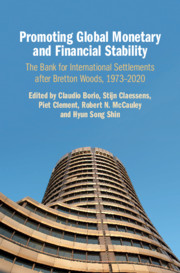 Promoting Global Monetary and Financial Stability
Promoting Global Monetary and Financial Stability Book contents
- Promoting Global Monetary and Financial Stability
- Studies in Macroeconomic History
- Promoting Global Monetary and Financial Stability
- Copyright page
- Contents
- Graphs and Tables
- Contributors
- Foreword
- Acknowledgements
- Abbreviations
- Introduction
- 1 The BIS and the European Monetary Experiment
- 2 The Governance of the Bank for International Settlements, 1973–2020
- The BIS in Pictures, 1973–2020
- 3 A Theory of Everything
- 4 Tower of Contrarian Thinking
- 5 Exchange Rates, Capital Flows and the Financial Cycle
- 6 The Bank for International Settlements
- Book part
- Note on Sources
- Bibliography
- Index
- Other Books in the Series (Continued from p. ii)
5 - Exchange Rates, Capital Flows and the Financial Cycle
On the Origins of the BIS View
Published online by Cambridge University Press: 10 April 2020
- Promoting Global Monetary and Financial Stability
- Studies in Macroeconomic History
- Promoting Global Monetary and Financial Stability
- Copyright page
- Contents
- Graphs and Tables
- Contributors
- Foreword
- Acknowledgements
- Abbreviations
- Introduction
- 1 The BIS and the European Monetary Experiment
- 2 The Governance of the Bank for International Settlements, 1973–2020
- The BIS in Pictures, 1973–2020
- 3 A Theory of Everything
- 4 Tower of Contrarian Thinking
- 5 Exchange Rates, Capital Flows and the Financial Cycle
- 6 The Bank for International Settlements
- Book part
- Note on Sources
- Bibliography
- Index
- Other Books in the Series (Continued from p. ii)
Summary
Based on a thorough analysis of the BIS Annual Reports from the early 1970s to the late 2010s, this chapter traces the evolution of the BIS’s thinking on the international monetary and financial system. It demonstrates how – as a result of the growth of the Eurocurrency markets in the 1970s and of the sovereign debt crisis of the 1980s – the BIS’s traditional focus on exchange rates and their potential impact on monetary stability gradually shifted to global capital flows and to the risks posed by an increasingly complex and interconnected banking system. The 1995 Mexico crisis and 1997–8 Asian crisis reinforced this shift and led to an overriding concern with the procyclicality of the financial system as a potential threat to financial stability. While recognising that the focus of the BIS on a macro-financial stability framework has contributed a lot to advancing the work of the Basel-based committees and standard-setting bodies, the chapter also concludes that not much progress has been made in coordinating monetary policies or in addressing the fundamental problem of excessive elasticity of the financial system.
Keywords
- Type
- Chapter
- Information
- Promoting Global Monetary and Financial StabilityThe Bank for International Settlements after Bretton Woods, 1973–2020, pp. 168 - 205Publisher: Cambridge University PressPrint publication year: 2020


